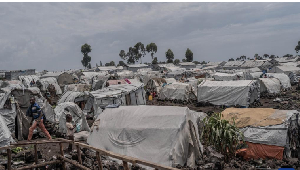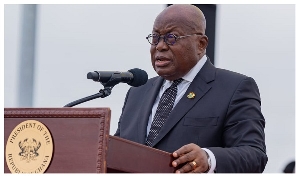- Home - News
- TWI News | TV
- Polls
- Year In Review
- News Archive
- Crime & Punishment
- Politics
- Regional
- Editorial
- Health
- Ghanaians Abroad
- Tabloid
- Africa
- Religion
- Election 2020
- Coronavirus
- News Videos | TV
- Photo Archives
- News Headlines
- Press Release
General News of Tuesday, 25 October 2011
Source: GNA
Three to Four billion dollars is lost to corruption annually?

Accra, Oct. 25, GNA - About three to four billion dollars is lost to corruption every year, Mr Franklin Cudjoe, Executive Director of Imani Ghana, a think tank, ranked the fifth most influential in Africa in 2009, he said.
According to Imani Ghana the amount contributes to the annual African average of 150 dollars grand theft, considering the waste, plain stealing, political deals, the 10 per cent kick backs and the slippages from the District Assemblies Common Fund.
Mr Cudjoe made this known at the 5th Moderatorial Business Luncheon, organised by the Presbyterian Church of Ghana to serve as an effective social networking and connectivity between the church and its stakeholders.
It was on the theme: “Ghana’s Economic Management and Development – The Current State of Affairs.”
Referring to the Auditor General’s report in 2009, Mr Cudjoe said close to one billion dollars was lost to payroll fraud alone, meaning that the astonishing levels of ghost names drawing salaries from the government’s pay roll had increased.
He bemoaned the justification given to the litany of taxes charged the average Ghanaian from income to punitive double digit corporate taxes.
Mr Cudjoe said mobile technology can now be deployed in fighting corruption as India and Bangladesh has shown the way.
He said local government officials can use mobile phones to account for taxes paid and efficient service delivery at the local level.
“We have become accustomed to counting only the number of mobile phone users for the sole purpose of taxing them without actually giving back any direct rewards in service delivery,” he added.
Mr Cudjoe blamed government’s wasteful nature on the overbearing nature of the Executive Presidency, saying, “Our presidency is too powerful, coupled with a free willing Parliamentary majority.”
Commenting on Ghana’s oil find, the Policy Analysts said Ghana’s oil wealth as a nation signifies her sovereign wealth status, a source of development, not a source for risky entrepreneurial investment.
He suggested the need for Ghana to invest almost all her oil revenue in infrastructure, roads, water, electricity and education within the next 10 years.
Such investments, Mr Cudjoe said will create their own rewards and prevent the famed Dutch disease (where the economy is centered on one commodity).
Mr Cudjoe said it is not the many models for oil management that matter but rather “good and accountable governance that does the trick”.
“It is important for us to make corruption a disincentive by not treating a one million dollar theft as a misdemeanour under the current constitutional dispensation, leading to a mere three to five years sentencing only.”
Ms Dzifa Attivor, Deputy Minister of Transport who spoke on behalf of Vice President John Dramani Mahama, said government believes that the church and state have one common purpose to uplift humanity spiritually, economically socially and physically.
She therefore commended the Presbyterian Church of Ghana for building health facilities and educational institutions to complement government’s efforts.
Ms Attivior urged the church to disseminate the message of peace especially as Ghana approach Election 2012.
Nana Owusu Afari, President of the Association of Ghana Industries and Chairman of Afariwaa Group of Companies, who chaired the programme, advised young entrepreneurs not to use short cuts in their businesses.
“There is no short-cut to making it to the top, “he stressed.
He said it is possible for one to be ethical devoid of corrupt practices and still have a profitable business.
Nana Afari also advised the Presbyterian Church to position itself to provide appropriate responses to the trends of indiscipline in the country, saying “Presbyterian discipline is under threat.”
Right Reverend Professor Emmanuel Martey, Moderator of the General Assembly of the Presbyterian Church, praised the investment environment in Ghana, which he said has been made so favourable.
He said the favourable conditions need to reflect meaningfully in the daily lives of ordinary Ghanaians.
“Our faith as a church compels us to embark upon constructive engagement with government and political leadership to promote sustainable development,” he said.










